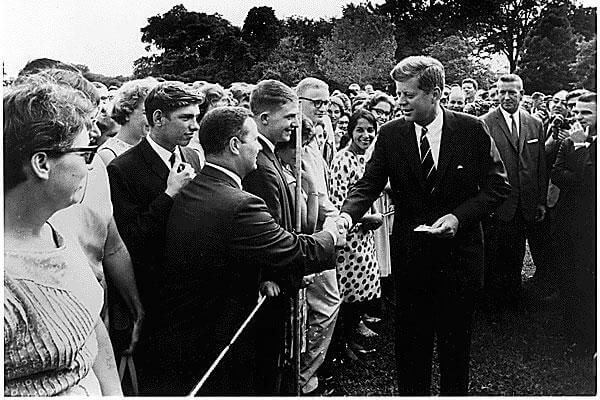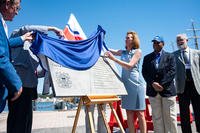For American service members, coming back from war can be its own form of psychological trauma.
That's a theory advanced by acclaimed author and war journalist Sebastian Junger in his recently published book, "Tribe: On Homecoming and Belonging."
Best known as the co-creator of gritty Afghanistan war documentaries "Restrepo" and "Korengal" and author of the book, "A Perfect Storm," Junger argues in "Tribe" that the military community thrives amid trauma and danger, but tends to become lost in the relative peace and security of our stratified modern society.
When troops leave their tight-knit community, Junger writes, they often feel isolated and detached, reporting a form of reentry trauma that he argues is frequently misidentified as post-traumatic stress disorder (PTSD).
Junger avoids proposing a comprehensive solution to the problem he presents in "Tribe." But he told Military.com in an interview this month that one possible way to build a more cohesive society might be to create a different kind of draft: one in which some form of national service is mandatory for all eligible citizens, but the military is only one of several service choices, along with options like the Peace Corps and urban improvement projects.
"I think it's a shame that the only way to serve your country is with a gun," Junger said. "I think mandatory national service would throw every component of society into a pot together and stir it up, black, white, poor … everybody goes in there. And it would give young people a very valuable lesson that they're actually part of this incredible experiment."
Here are more questions and answers from the Military.com interview:
Q: You've received a lot of attention for Tribe because of your commentary regarding troops and veterans, but you don't actually discuss the military until the third quarter of the book. Were there other points of entry for you in writing this book?
A: I contemplated writing this book without talking about soldiers or PTSD at all. What interested me was the effect of modernity or the loss of communalism on our well being. I could have easily written this book without talking about soldiers, and I thought about it.
People advised me to start with soldiers and PTSD, and that to me was so not the point of the book that I was afraid it would be misleading to start with it, because it would make it look like that was my central concern and it really isn't.
But I feel like one way to understand modern society is to look at it from the eyes of people who are from here, who have gone away from it, and have come back. What do they see when they come back? What's missing? The reason I write about vets and PTSD is because it's such a great lens through which to see ourselves.
Q: You talk about the dangers of "over-valorization" of veterans for their service. What do you mean, and what are the greatest risks of doing that?
A: At one point, I use the phrase, you don't want to "ghettoize" soldiers and veterans in their heroism. You don't want to create a separate class of superior beings who aren't expected to engage in everyday life.
There's a wonderful painting by Winslow Homer that I just saw in The New York Times yesterday. It shows a young man with a scythe, it was painted in 1865 and he's cutting wheat. And it's called, 'The Veteran in a New Field.' This is fall harvest, immediately after the Civil War, and he's already back to work. It's an amazing painting, and it says a lot.
Obviously we aren't to assume that anyone who's physically or psychologically incapacitated needs to be taken care of by this society. But I think when you create excessive financial incentives to see yourself as psychologically incapacitated,when you self-diagnose PTSD and then apply for lifelong disability payments that are enough money that you don't have to work again, you risk turning soldiers into wards of the state. Their psychological health is ill-served by that.
Meanwhile, people who really, desperately need help have trouble getting it in an efficient and timely fashion at the VA. The irony is in both directions.
Q: What are other things society does that you think ultimately interfere with veterans' reintegration?
A: As nice a gesture as it is, letting military board airplanes first or have special parking spots probably doesn't speed their reintegration into a society where we all have to wait in line and look for parking. It's a totally nice gesture, but I don't think it speeds reintegration.
If we're not interested in reintegrating them, then let's keep doing that. I know it's heartfelt and well meant. But the effect is, it communicates [that] you're actually not one of us. We're not worthy of being in the same room with you.
Q: The post-Vietnam wars have been fought with an all-volunteer military. What do you believe are the consequences for troops and American society from fighting wars with volunteers?
A: If you have a draft, you definitely have people more focused on whether you're at war or not. You think college kids today are thinking about the war? No, not really. They definitely would be if they had a draft number that was going to come up as soon as they graduated.
That said, the draft has never kept America out of a war. There's some social justice in it. Maybe that would be the best argument for it. But there's also a moral argument against making people commit violence that they're opposed to. You could argue that having a small military could [restrain] us because … limitations of manpower could keep us from overextending into wars we don't need to fight.
You could make the opposite argument in that the draft and having masses and millions of people ordered to be at arms would actually allow the government to fight more wars than it needs to. You could argue it either way.
Q: You describe a contrast between order, and isolation and chaos that fosters close-knit community -- what you say troops experience in combat. Is there a middle ground?
A: Humans are probably wired to have it both ways. I don't know if we can. The closest I come to making recommendations is at the end of the book, where I talk about this veteran town hall idea [in which veterans can publicly share their experiences and perspectives from combat]. I think that those can act in really positive ways in communities, positive both for vets and for the communities themselves.
The reason veterans have a hard time coming home isn't because there's something inherently flawed about the transition process. It's because there's nothing to come home to. There's a society that's barely glued together and bitterly fractured.
There's the old joke, falling is not the problem, it's hitting the ground that hurts. Likewise, the transition isn't the problem; it's what they're trying to transition to. And ,ultimately, to help the vets we have to heal ourselves.
Q: You've said you're done writing about war. What's next?
A: I started covering war in the early ‘90s and I started thinking about this stuff in college as an anthropologist. In Tribe, though it's a short book, it's a sort of integration of things I've been working on and thinking about my entire life.
I was telling a friend of mine … I cooked one last meal that had everything in the refrigerator. I just put it all in a big pot, and now I need a new refrigerator and I don't even know where to go shopping. I don't know what's coming next, but something, I'm sure.
Tribe is published by Twelve, an imprint of Hachette, and went on sale in May.
--Hope Hodge Seck can be reached at hope.seck@military.com. Follow her on Twitter at @HopeSeck.



























